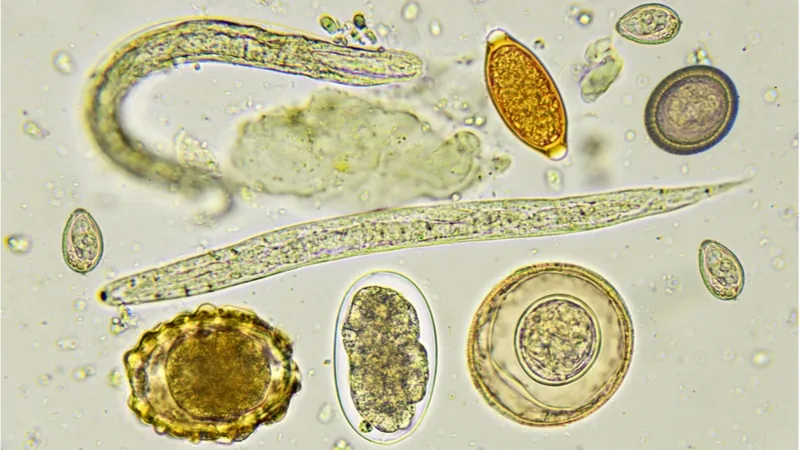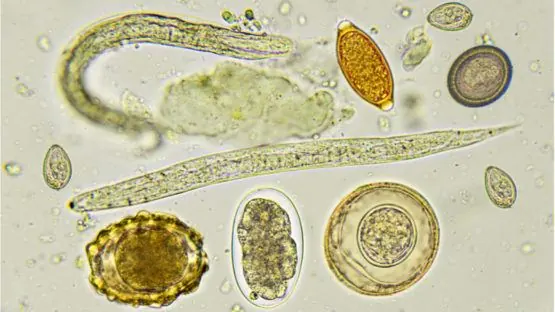A review conducted by researchers at the Institute for Healthy Ageing at University College London in the UK has determined that infestation of the gut microbiome by helminths, a category of parasitic worms, may be a potential method of curbing the age-related inflammation known as inflammaging, thus delaying the onset of age-related diseases.
The ‘old friends’ hypothesis
The Western world has largely eradicated a great many parasites, helminths among them. However, as this review’s authors explain, we did not evolve to live in a world without such parasites, and the absence of our ‘old friends’ can cause dysbiosis: an imbalance of the microbiome. One of the downstream effects of such dysbiosis is immunological hyperactivity, which leads to immunity-related disorders [1].
In fact, one study in Argentina had shown that in patients with multiple sclerosis, parasite infection was associated with reduced severity of the disease; when the parasites were cleared, the disease got worse [2]. Another study in eastern India found that of the 207 people in their study who were suffering from rheumatoid arthritis, none of them had been infected by a local nematode; 40% of the healthy controls had [3]. The researchers also list many studies that suggest that helminth infection reduces pro-inflammatory cytokines and C-reactive protein, all of which are associated with inflammaging and its related disorders.
What’s going on, biochemically
The review’s authors list multiple studies that have pointed to the glycoprotein ES-62 as the causative agent in helminths’ effects against autoimmunity. The worms had evolved this protein to protect themselves against the human immune system, and the researchers hypothesize that we have co-evolved along with the parasite, causing this protein to be beneficial in dampening overreactions of our own immune systems. However, the exact biochemical effects of ES-62, and how, precisely, it interacts with the human immune system, have not yet been explored.
Replacing the protein itself
It stands to reason that, because few people want to actually be infected by parasitic intestinal worms, we should be able to isolate ES-62 and administer it as a therapy instead. This has shown effects in rodent studies; one mouse model of accelerated aging brought about by a high-calorie diet (which is, of course, also common in the Western world) has shown that weekly administration of ES-62 lengthened their lives by 12% [4]. However, as the researchers warn, there may be unknown, additional immunomodulatory factors provided by helminths.
Conclusion
As the researchers explain, this line of therapy is in its infancy and needs to be explored much more thoroughly before we can come to any definitive conclusions regarding its use in longevity. While some exploratory research has been conducted, no one has done any lifespan studies relating to ES-62 or helminths on mice fed a normal diet.
Obviously, parasitic worm infestation is not desirable; while inflammaging is a direct cause of serious issues, intestinal worms can cause serious and immediate health problems. We look forward to the development of therapies that use helminth-related research to curb inflammaging without requiring people to be infected with harmful parasites.
Literature
[1] Rook, G. A., Adams, V., Hunt, J., Palmer, R., Martinelli, R., & Brunet, L. R. (2004, February). Mycobacteria and other environmental organisms as immunomodulators for immunoregulatory disorders. In Springer seminars in immunopathology (Vol. 25, No. 3, pp. 237-255). Springer-Verlag.
[2] Correale, J., & Farez, M. F. (2011). The impact of parasite infections on the course of multiple sclerosis. Journal of neuroimmunology, 233(1-2), 6-11.
[3] Panda, A. K., Ravindran, B., & Das, B. K. (2013). Rheumatoid arthritis patients are free of filarial infection in an area where filariasis is endemic: comment on the article by Pineda et al. Arthritis & Rheumatism, 65(5), 1402-1403.
[4] Crowe, J., Lumb, F. E., Doonan, J., Broussard, M., Tarafdar, A., Pineda, M. A., … & Harnett, M. M. (2020). The parasitic worm product ES-62 promotes health-and life-span in a high calorie diet-accelerated mouse model of ageing. PLoS pathogens, 16(3), e1008391.





